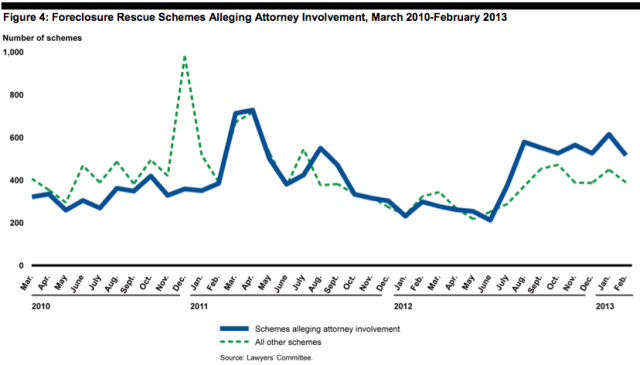Foreclosure Rescue Schemes and You
- It is illegal in most cases to charge an up-front fee for foreclosure relief services or mortgage modifications.
- Nonprofit housing counseling agencies provide free foreclosure prevention counseling services. These agencies are funded, in part, by the Department of Housing and Urban Development (HUD) and NeighborWorks.
- You can confirm that a company is a HUD-approved housing counseling agency by going to HUD’s website.
- Forensic audits. Scammer offers to review a homeowner’s mortgage loan documents to determine whether the lender complied with state and federal mortgage lending laws.
- Bankruptcy to avoid foreclosure. Scammer promises to negotiate a loan modification with the lender for a fee, but files a bankruptcy case in the homeowner’s name. The bankruptcy process temporarily halts all debt collection efforts, including foreclosure proceedings, making it appear as if the scammer has done something to help.
- Mass joinder lawsuits. Scammer, usually an attorney or law firm, will promise the homeowner that the lender can be forced to modify the loan through this type of legal action.
- Short sale schemes. Scammers, sometimes called "short sale negotiators" or "short sale processors," promise to expedite a short sale and usually require the homeowner to pay a fee for these services.

Image excerpted from GAO-14-17
Watch our AskGAOLive web chat on Foreclosure Rescue Schemes from November 2013: https://www.youtube.com/watch?v=PV1PG1391KY- Questions on the content of this post? Contact Lawrance Evans, Jr. at EvansL@gao.gov.
- Comments on GAO’s WatchBlog? Contact blog@gao.gov.

GAO's mission is to provide Congress with fact-based, nonpartisan information that can help improve federal government performance and ensure accountability for the benefit of the American people. GAO launched its WatchBlog in January, 2014, as part of its continuing effort to reach its audiences—Congress and the American people—where they are currently looking for information.
The blog format allows GAO to provide a little more context about its work than it can offer on its other social media platforms. Posts will tie GAO work to current events and the news; show how GAO’s work is affecting agencies or legislation; highlight reports, testimonies, and issue areas where GAO does work; and provide information about GAO itself, among other things.
Please send any feedback on GAO's WatchBlog to blog@gao.gov.
